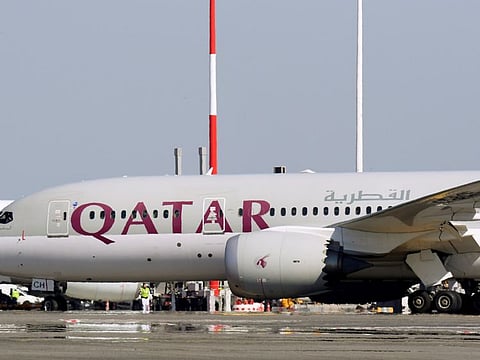Syria and Qatar silently mend broken fences
Rapprochement steps come from a mutual desire to break their respective isolation

Beirut: After eight years of being at the each other’s throats, Syria and Qatar are taking baby steps towards normalisation, triggered, it seems, by Iraqi mediation, economic needs, and a mutual desire to break their respective isolation.
On Monday, Qatari Airways was granted a license to fly over Syrian airspace, according to an official statement by the Syrian Tourism Ministry.
It came on the heels of a quick visit to Damascus by Iraqi National Security Adviser Faleh Al Fayyad, who carried messages from Doha to Damascus the previous week.
Flights had been suspended along with diplomatic relations back in 2011, when the two countries found themselves on opposite sides of a gruelling eight-year civil war.
Doha was a staunch backer of Islamist rebels fighting to overthrow Syrian president Bashar Al Assad.
For Qatar, the move will save the state airline 90 minutes of air time which will also save the company money on fuel.
Previously, the airline would have to go around Syria, through Iraq and Turkey.
Syria, on the other hand, will charge Qatar Airways to use its airspace.
Because of the astronomical cost of the war, the Syrian government, although victorious, is severely cash strapped, and needs all the money it can get—even if this means cooperating with a once despised foe.
“This development shows that both the Syrian regime and its former adversaries are pragmatic enough to move on,” said Hassan Hassan, a ranking Washington-based Syrian political analyst, working at the Center for Global Policy, told Gulf News.
Qatar regionally isolated
Qatar, is also extremely isolated after Saudi Arabia, the UAE, Bahrain and Egypt severed ties on June 5, 2017, accusing it of backing extremists.
“Qatar Airways needs as much air space as it can get because Saudi Arabia and its allies have blocked it from using theirs,” he added.
Qatar Airways has lost approximately $69 million annually after the Arab Quartet severed ties in 2017.
The developments are an interesting turn of events after only three months ago Qatar called normalisation with Damascus “unacceptable”.
While other Arab countries, such as the UAE, Bahrain and Jordan have taken steps to restore ties, Qatar’s foreign minister Mohammad Bin Abdul Rahman Al Thani said his country had no intention of re-engaging with a regime that was “guilty of war crimes”.
However, interestingly enough, during a speech earlier this year where Al Assad chastised Turkish President Recept Tayyip Erdogan he conveniently left out any criticisms of Qatar.
Turkey and Qatar are close allies who are top backers of the Muslim Brotherhood. They both backed Islamist rebels in the Syrian war.
Damascus insists that the airspace agreement came at the request of Doha, who addressed Syrian authorities as “the esteemed government of Syria”.
First rapprochement steps
Steps towards rapprochement began in March 2018, when the sports federation of the two countries signed a low-profile cooperation agreement in the training and exchange of athletes.
In May, investigative British journalist Robert Fisk said that during a recent visit to Damascus, where he is given access to top command, he heard that Syrian-Qatari relations had resumed “at a low-grade and humble level.”
During the war, the two countries had worked together, via Lebanese mediation, on the release of 13 nuns kidnapped by the Islamist Jabhat Al Nusra rebel group, back in 2014.
Lebanon did the bidding, Qatar paid the ransom money, and, in exchange, Syria released 153 women prisoners to Al Nusra.
Prior to this mediation, the Qataris had generously bankrolled Islamist rebels since 2011.
According to the Financial Times, Qatar paid up to $3 billion to various Syrian opposition groups during the first two years of the civil war, with up to $50,000 USD annually for every defector.
Several prominent former Syrian officials, like ex-Prime Minister Riad Hijab, were residents of Doha until very recently.
Prior to the conflict, the two countries had enjoyed exceptionally warm relations under the era of the present emir’s father, Hamad Bin Khalifa Al Thani, who had a villa in Damascus, presented to him by his Syrian counterpart.
However, Hamad’s embrace of the opposition led to closure of the Qatari Embassy in Damascus and the shutting down of the Doha-based Al Jazeera Television.
Al Jazeera ban lifted
Two weeks ago, a state-imposed proxy over the channel’s website was lifted, for both the Arabic and English versions.
“Secretly or publicly, many countries like Qatar are considering a U-turn,” said prominent Syrian oppo-sition writer Fayez Sara.
“If the international community has reasoned that Bashar is there to stay, therefore, they all need to restore relations with his regime, each according to their own country’s specific interests.”
However, he did not believe that that regional rapprochement with Syria will expand to Turkey or Sau-di Arabia.



